NOVA: The Planets Blu-ray Movie
HomeNOVA: The Planets Blu-ray Movie 
PBS | 2019 | 300 min | Not rated | Aug 27, 2019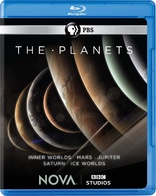
Movie rating
6.9 | / 10 |
Blu-ray rating
| Users | 0.0 | |
| Reviewer | 3.5 | |
| Overall | 3.5 |
Overview
NOVA: The Planets (2019)
Among the stars in the night sky wander the eight-plus worlds of our own solar system—each home to truly awe-inspiring sights. Volcanoes three times higher than Everest, geysers erupting with icy plumes, cyclones larger than Earth lasting hundreds of years. Each of our celestial neighbors has a distinct personality and a unique story. In this five-part series, NOVA will explore the awesome beauty of “The Planets,” including Saturn’s 175,000-mile-wide rings, Mars’ ancient waterfalls four times the size of any found on Earth, and Neptune’s winds—12 times stronger than any hurricane felt on our planet. Using unique special effects and extraordinary footage captured by orbiters, landers and rovers, we’ll treat viewers to an up-close look at these faraway worlds. We’ll stand on the dark side of Pluto, lit only by the reflected light of its moons, watch the sun set over an ancient Martian waterfall, and witness a storm twice the size of Earth from high above Saturn. And, we’ll reveal how each of them has affected our own planet: Earth.
Narrator: Zachary QuintoDirector: Stephen Cooter, Martin Johnson (IV)
| Documentary | 100% |
Specifications
Video
Video codec: MPEG-4 AVC
Video resolution: 1080p
Aspect ratio: 1.78:1
Original aspect ratio: 1.78:1
Audio
English: DTS-HD Master Audio 5.1 (48kHz, 16-bit)
Subtitles
English SDH
Discs
Blu-ray Disc
Two-disc set (2 BDs)
Playback
Region A (B, C untested)
Review
Rating summary
| Movie | 4.0 | |
| Video | 3.0 | |
| Audio | 4.5 | |
| Extras | 0.0 | |
| Overall | 3.5 |
NOVA: The Planets Blu-ray Movie Review
Reviewed by Randy Miller III September 8, 2019Developed by BBC TV and the UK's Open University, The Planets was a five-part documentary series that explored all nine eight
planets in our solar system. Comprised of interviews with NASA scientists, space mission footage, and an extensive amount of CGI, The
Planets fuses past, present, and possible future events to theorize how the formation and development of each planet has affected the
others...and of course, what might happen in another few billion years. This is a far-reaching but accessible production, with each ~52 minute
episode venturing further away from our sun into territory never properly explored until recent years. Originally narrated by English physicist and
professor Brian Cox, The Planets was reconfigured for American audiences as part of PBS' long-running science program NOVA,
which replaced Cox with Star Trek
actor Zachary Quinto. At least he's a more fitting substitute than Oprah, right?
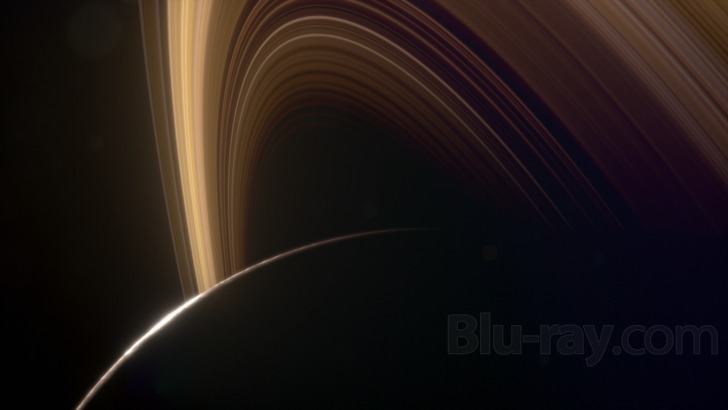
Although it feels more than a little daunting at times, The Planets does an admirable job of keeping things smooth and entertaining without sacrificing a good education. I'll admit that certain phrases and explanations went right over my head, leading to a few post-show Internet searches before the next episode. Truth be told, The Planets is probably best digested in smaller portions anyway: several of these episodes feel structurally repetitive, as a number of short CGI sequences are reused three or four times and a few statements are even repeated with different phrasing. Even so, there's a lot to take in and plenty to think about after the credits roll...so while The Planets may not be ideal binge-watching material for everyone, viewers will find this five-part series enjoyable at their own individual pace.
- Inner Worlds - This premiere episodes focuses on the four most familiar planets: Mercury, Venus, Earth, and Mars. The first is explored in more detail and from different perspectives -- including its turbulent creation -- as well as the favorable conditions all four enjoyed at different times...but obviously, just one has continued to maintain life as we know it. Will either of the others be the next Earth in our far-away future?
- Mars - The young "red planet" was more blue long ago, when evidence suggests it supported an Earth-like climate and deep oceans. But when a cosmic event known as the Late Heavy Bombardment showered Mars with asteroids for millions of years, the once-beautiful planet was stripped of its atmosphere and water.
- Jupiter - A history of the biggest (and oldest) planet in our solar system and its turbulent relationship with neighboring Saturn. From its pre-Sun birth to the way Jupiter's immense gravity has shaped the development of every other planet, evidence suggests that it directly caused the shift from Mars' early demise to the later rise of Earth...but may also one day shorten our planet's long history of supporting complex life.
- Saturn - Another episode that divulges fascinating new insight into the planet's life thanks to the Cassini probe, which likewise includes imagery gathered during the spacecraft's many fly-bys. There are plenty of great stories here, from the surprisingly recent birth of its beautiful rings -- made of fragments from an icy moon pulled into the gas giant's immense gravity -- to the beautiful oceans of its sixth-largest moon, Enceladus.
- Ice Worlds - This final chaper examines the two furthest planets, Uranus and Neptune, which were originally glimpsed in detail by the Voyager 2 probe after a rare planetary alignment in 1976. Things changed in 2015 once NASA's New Horizons probe took an even further journey, revealing a detailed view of the dwarf planet Pluto and other items of interest that lie beyond. All three bodies are revealed in greater detail than before, from ice volcanoes to geysers and an underground ocean. An excellent finish to this ever-expanding story.
Collectively, this is a great series and worth watching for casual and seasoned space fans alike. But while a strong main feature and low price
almost make The Planets a no-brainer, PBS's Blu-ray comes up a bit short in two key areas.
NOVA: The Planets Blu-ray Movie, Video Quality 

While NOVA: The Planets is a mix of challenging source materials, I am not convinced that this Blu-ray presents many of them in the best possible manner. The most glaring problems here are banding and compression artifacts, which are troublesome even at a high bit rate: these episodes regularly hover well above 30 Mbps, but their 1080p transfers often struggle to keep up with all of the visual complexities. The banding can be seen on harsh and subtitle gradients alike, especially when light sources disrupt the pitch-black of space. Those compression artifacts can likewise be distracting at times but may be "baked into" the original source material; as mentioned earlier, there's a lot of CGI on display here. Yet other portions of footage have not been handled with care either: older clips, shot on a variety of formats including consumer-grade VHS and Betamax, are presented in an odd CinemaScope-style aspect ratio (yes, blown up and then liberally cropped). While it's more of an issue with the filmmaking than the Blu-ray, this clearly does the transfer's consistency no favors: it exacerbates existing problems and also makes these scenes hard to "read", as any type of native framing or composition is thrown out the window. Everything else looks fine, with the caveat that things like color temperature or textures fall within the wide boundaries of its fantastic, far-reaching locales.
While I'm tempted to give The Planets the benefit of the doubt in some regards (static photos and high-res satellite imagery look outstanding, and some of the compression and banding issues aren't nearly as noticeable in-motion), as a whole the Blu-ray is just too visually inconsistent to forgive its fundamental problems. These shortcomings aren't necessarily a deal-breaker by any means, but a 4K edition would have likely yielded better results.
NOVA: The Planets Blu-ray Movie, Audio Quality 
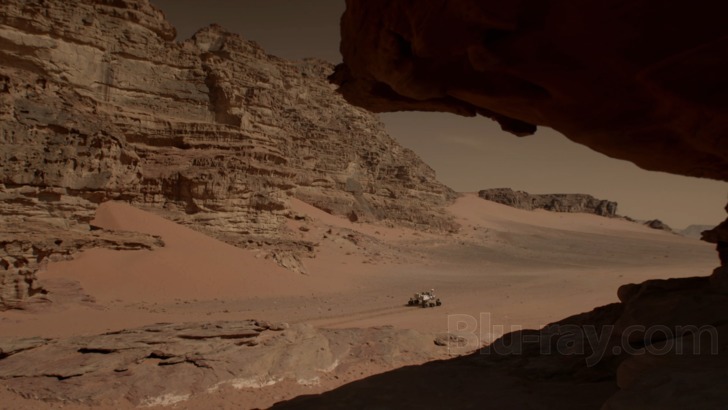
Less contentious is The Planets' DTS-HD 5.1 Master Audio presentation: this is a frequently stunning track with lots of surround activity, clear sonic details, nice channel separation, a somewhat hefty low end, and crisp narration. As most of the cosmic locales were basically built from scratch, this allows for a lot of freedom within semi-realistic boundaries, with the end result being an enjoyable and atmospheric (pun intended) sound field that frequently envelops the viewer in a satisfying way. Obviously the interviews are channeled much more front-and-center but enjoy a similar level of clarity and depth, while Zachary Quinto's narration is given a bit more width and dynamic range in direct comparison. Overall, it's a fine effort that gets the job done with energy to spare -- and aside from an option to play the original narration by Brian Cox (assuming it would even fit this format), there's really no room for improvement.
Optional English (SDH) subtitles have been included during all five episodes; these are formatted properly and, though a bit on the small side, very legible with no obvious sync errors.
NOVA: The Planets Blu-ray Movie, Special Features and Extras 
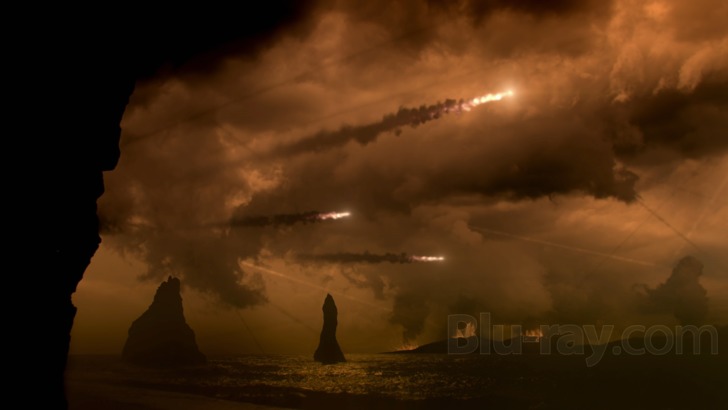
PBS' Blu-ray presentation of NOVA: The Planets is packaged in a dual-hubbed, eco-friendly keepcase with a promotional insert and colorful disc artwork. The menu interface looks sleek and simple but is somewhat confusing, as selecting each episode presents viewers with a chapter list rather than playing it automatically. (The first chapter of each episode is a preview for it, so just begin with the second chapter to start the show proper.)
Aside from said previews, no bonus features have been included.
NOVA: The Planets Blu-ray Movie, Overall Score and Recommendation 
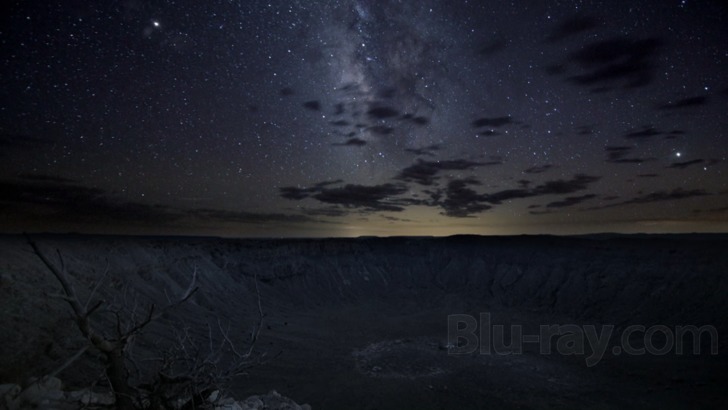
BBC Earth's The Planets is a welcome change of pace from their typically Earth-bound documentaries, and a natural fit for the PBS series NOVA where it was reconfigured for American audiences. Although I would have preferred a straight port of its original format, Zachary Quinto's narration is capable and will obviously draw in a lot of casual sci-fi fans. Although I have yet to see the BBC version, I am intrigued as to how much (or how little) has been changed, but this is still quality entertainment in its present form. Unfortunately, PBS' Blu-ray leaves something to be desired: the 1080p transfer has a few obvious shortcomings and there are no extras, so anyone with a modest home theater setup may not notice much of an improvement over streaming or broadcast versions. While it's priced fairly enough to make The Planets a low-risk investment, this Blu-ray mainly comes recommended for its main feature and audio mix.
NOTE: Region-free fans interested in the original BBC mini-series can find it on Blu-ray right here.
Similar titles
Similar titles you might also like
(Still not reliable for this title)

How the Universe Works
2010

Journey to Space 4K + 3D
IMAX
2015

Space Junk 3D
IMAX
2013

Cosmos: A Spacetime Odyssey
2014

A Beautiful Planet 4K
IMAX Enhanced
2016

Armstrong
2019

Filmworker
2018

Exit Through the Gift Shop
2010

3-D Rarities
1922-1962

Mankind: The Story of All of Us
2012

Voyage of Time
2016

IMAX: Dream Big: Engineering Our World 4K + 3D
2017

Mysteries of the Unseen World 3D
2013

Flying Monsters 3D
2011

Winged Planet 3D
2012

Arabia 3D
IMAX
2010

Legends of Flight 3D
IMAX
2010

The Universe: 7 Wonders of the Solar System 3D
2010

Kingdom of the Blue Whale
2009

A Place at the Table
2012